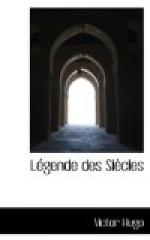G. F. BRIDGE.
LONDON, March, 1907.
BIOGRAPHICAL SKETCH
Victor-Marie Hugo, son of an officer in Napoleon’s army, was born at Besancon on February 26, 1802. He spent a roving and unsettled childhood, for wherever the father was sent the mother and children followed. The first three years of his life were spent in Elba, where he learnt to speak the Italian dialect spoken in the island in addition to his mother tongue. Then for three years the family was in Paris and Victor got a little education in a small school. But in 1805 the father was appointed to a post in the army of Naples, and in the autumn of 1807 his wife and children joined him at Avellino. Two years later General Hugo was invited by Joseph Bonaparte to fill an important position in the kingdom of Spain, and, desirous that his sons should receive a good education, he sent his family to Paris, where his wife chose for their home the house in the Rue des Feuillantines which has been so charmingly described by the poet in the lines Ce qui se passait aux Feuillantines. There he learnt much from an old soldier, General Lahorie, who, obnoxious to Napoleon for the share he had taken in Moreau’s plot, lived secretly in the house, and from an old priest named Lariviere, who came every day to teach the three brothers. There too he played in the garden with the little Adele Foucher, who afterwards became his wife. But this quiet home life did not last long. In 1811 Madame Hugo set off to join her husband at Madrid, and the boys went with her. At Madrid they were sent to a school kept by Priests where Victor was not very happy, and from which he got small profit. Next year the whole family returned to Paris, and in 1815, at the age of thirteen, he was definitely sent to a boarding-school to prepare for the Ecole Polytechnique. But his was a precocious genius, and he devoted himself, even at school, to verse-writing with greater ardour than to study. He wrote in early youth more than one poem for a prize competition, composed a romance which some years later he elaborated into the story Bug-Jargal, and in 1820, when only eighteen, joined his two brothers, Abel and Eugene, in publishing a literary journal called Le Conservateur Litteraire. About the same time he became engaged to Adele Foucher, and wrote for her the romance of Han d’Islande, which, however, was not published till later. In 1822 he and Adele




